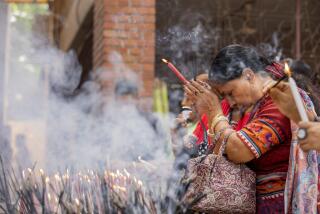War of Words Turns Fatal in India : Violence: Dispute over Urdu language being used on a 10-minute TV broadcast leads to riots, 17 deaths.
- Share via
NEW DELHI — In India’s latest collision of the sadly familiar and the new, a dispute between Hindus and Muslims over language has led to riots, arson and the deaths of 17 people in the country’s fast-growing capital of high tech, officials said.
The spark for two days of turmoil in Bangalore, India’s version of Silicon Valley and home to branch offices of many U.S. computer and software companies, was a new 10-minute daily television broadcast in Urdu, the idiom of the Mogul empire, which today is spoken by 130 million Muslims in India and Pakistan.
The Hindu nationalist Bharatiya Janata Party in the south-central Karnataka state accused the ruling Congress-I Party of launching the Urdu newscast to pander to Muslim voters in Karnataka before state elections next month.
What’s more, organizations defending Karnataka’s own dominant local language, Kannada, angrily protested that the 7:45 p.m. program cut into air time for their own tongue.
Ten minutes a day might not seem objectionable, since 9% of Karnataka’s 45 million people classify themselves as Urdu-speakers, but language has often been the stuff of divisive, violent politics in India. In fact, it was the reason Karnataka, known then as Mysore, was created in 1956 from the Kannada-speaking areas of five states.
For years, activists in the state have forced the government to cut back on the use of English, the language of India’s old colonial masters. And they remain militantly opposed to the penetration of Hindi, the Indo-European language that the constitution enshrines as India’s official lingua franca.
On Friday, the Muslim holy day, more than 3,000 Kannada activists opposing the Urdu newscast clashed with Muslims in Bangalore’s streets. Reports said the unrest broke out after Muslims threw stones and bottles at protesters who set up a roadblock near a mosque.
Police tried to halt the brawling with tear gas and batons, and opened fire when those measures failed. They used their guns again Saturday, when 300 people tried to attack police headquarters.
Despite a dusk-to-dawn curfew in Bangalore, violence continued throughout the night Friday and early Saturday as Kannada activists attempted to set fire to mosques, and Muslims defended them with lengths of chain and firebombs, police reported. Shops, warehouses and more than 100 vehicles were torched.
As of Saturday evening, eight people were reported shot dead by police, and nine others were stabbed to death in street brawls.
Karnataka Chief Minister M. Veerappa Moily estimated 150 people had been injured.
The controversial Urdu TV broadcast, Moily also announced to reporters, will be suspended until a time slot can be found that does not disrupt programming in Kannada.
The dispute over Urdu was just one of several signs of India’s social, economic and geographical strains.
In the northern state of Uttar Pradesh, the most populous in India, upper-caste but poor residents of the hills have violently objected to a state government that they say is run by and for lower-caste residents of the Ganges River plain. In Kashmir, India’s only state with a Muslim majority, a separatist insurgency continues.
On Friday, frustrated commuters in Bombay--stranded at morning rush hour by a derailed train--went on a rampage in five suburban stations, beating railway workers, burning stocks of tickets and putting the torch to two trains.
And, in a development that spread dread throughout the world, an estimated 300,000 to 400,000 people fled Surat near the Arabian Sea last month when their neighbors began to die of plague. The official death toll from the disease is 56, but the exodus showed how little confidence factory workers, artisans and even municipal officials and physicians put in authorities’ ability to treat victims and arrest the epidemic.
For Hindu militants, the status of Urdu is as much a hot-button issue as abortion is in the United States. To give the language special treatment is to favor Muslims, they contend.
Ironically, the language that became the chosen idiom of Muslim India and the national language of Pakistan--and is renowned for its beauty and sweetness of sound--is a close cousin of Hindi.
Moily said the decision to begin the newscasts in Karnataka was made in New Delhi and that his government was not involved at all.
Street protests by Hindu militants began when the Urdu news bulletin went on the air for the first time a week ago.
“It (was) not a political decision taken in view of the elections,” Moily contended.
More to Read
Sign up for Essential California
The most important California stories and recommendations in your inbox every morning.
You may occasionally receive promotional content from the Los Angeles Times.













